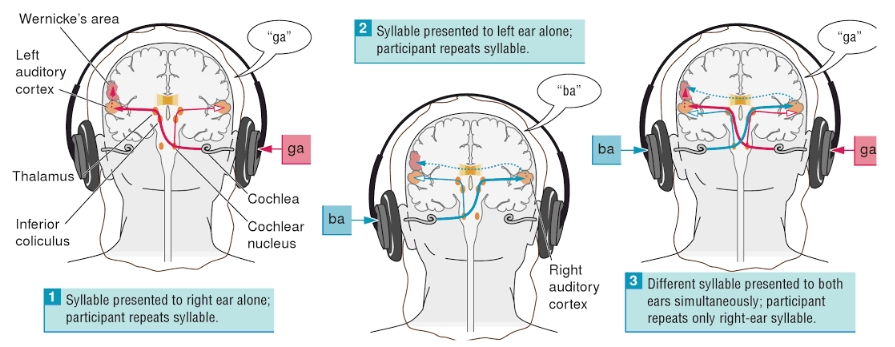I remember reading many years ago that this is normal...
Indeed, this is normal and quite expected: understanding one's voice is a brain task, not an ear (sensory organ) task, and if there is difference in the parsing capabilities between the left and the right hemisphere (which is the case, as we are going to see soon), the stimuli captured by the right ear will be treated differently from the stimuli captured by the left ear.
To understand what's happening here we have to know two things: the Wernicke's Area and Dichotic listening test.
The Wernicke Area, quoting Wikipedia, is...
...located in the posterior section of the superior temporal gyrus (STG) in the (most commonly) left cerebral hemisphere. It is involved in the comprehension or understanding of written and spoken language (in contrast to Broca's area that is involved in the production of language).
Thus, in most people, the left hemisphere is responsible for (most of) linguistic capabilities, both producing language (Broca's area) and understanding language (Werneck's area).
Now comes the dichotic listening test. In the dichotic listening test, two different stimuli are presented to each ear. The results of the test indicate that there is preference for the information captured by one of the ears.
According to Freberg (2010):
Dichotic Listening Is Related to Hemisphere Lateralization for Language: When conflicting information is provided to the two ears, the person who has language lateralized to the left hemisphere will show a preference for the word heard by the right ear. The information presented to the right ear will reach Wernicke's area in the left hemisphere faster than the information presented to the left ear. (emphasis mine)
Here is an image explaining the test (click for a larger size):

As you can see, there is a advantage to the right ear. According to Hugdahl et al. (2003):
In the present paper we report on speech perception in left (n=16) and right (n=10) frontal lobe nonaphasic patients compared with healthy controls (n=26). [...] The results showed significant differences between the left and right lesioned patients in their performance on the dichotic listening test. While the right lesioned patients and the control subjects had a normal and expected right ear advantage, the left lesioned patients performed almost at random with regard to the right and left ear stimulus. (emphasis mine)
Sources:

